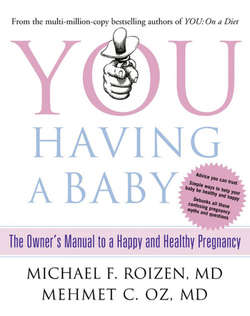Читать книгу You: Having a Baby: The Owner’s Manual to a Happy and Healthy Pregnancy - Michael Roizen F. - Страница 51
What’s in Your Belly?
ОглавлениеWhen you tally up pregnancy weight, you may assume that most of that weight comes from the mass of the baby or perhaps from fat accumulated during a bonbon binge. Not so. Here’s how your added weight is approximately divided for a twenty-nine-pound weight gain:
Baby: 7.5 pounds
Placenta: 1.25 pounds
Uterus: 2 pounds
Amniotic fluid: 2 pounds
Breasts: 1 pound
Blood volume: 4–5 pounds
Fat: 5 pounds
Tissue fluid: 6 pounds
Total: About 29 pounds
on a box of Cocoa Puffs,* or you’re perfectly satisfied and would much rather spend your time walking around the block or dreaming about what life will be like trying to get spaghetti sauce out of the carpet.
Contrary to what most people think, hunger isn’t influenced by willpower as much as by the messages that these hormones send to your brain. Ghrelin works in the short term: It sends out signals twice an hour, taunting and tempting you to gravitate toward the pantry. Leptin, though, works in the long term. If you can boost your leptin signals, you can ignore those ghrelin taunts—keeping your hunger (and thus your potential for dangerous pregnancy weight gain) in check.
Factoid: Need more evidence that junk food is just that? And addictive? Researchers found that when you feed some rats good food and some rats good food plus junk food, the rats enjoying the junk food wind up consuming 40 percent more food by weight and 56 percent more calories. Even worse: Their pups develop an affinity for junk, eat more, and gain more weight during their lifetimes than normal pups. If you want fat kids, feed yourself junk during pregnancy.
Factoid: One of the reasons you may be feeling a little hungry is because leptin, a hormone that controls hunger, is a little off during pregnancy. Receptors in the brain work to suppress chemicals that suppress your hunger—thus causing you to become more hungry—to ensure that you will eat enough to provide your baby more nutrients.
Certainly it would be nice if we could reach our pinkie fingers into our ears, search around our gray matter, and flip some cerebral switch that would keep the leptin light on and permanently cut the power source to ghrelin. But what we do have is the ability to flip the switches (in either direction) through the foods we eat. Those foods, and the chemical reactions they cause when they enter our bloodstream, can increase or decrease the effect of leptin and ghrelin. Fructose, for example, which is found in high-fructose corn syrup and in such devilish products as soft drinks and low-fat salad dressing, can cause your sensors not to receive the leptin message. That’s because many of these processed foods we’re seeing today are imposters; your brain simply doesn’t recognize them as real foods. The effect: As ghrelin goes up or leptin goes down, you reach for a fourth pepperoni stick. But if you eat real foods—like nuts, vegetables, whole grains, and lean animal protein—your brain gives your body a direct order: Let’s close ship, sir, this one’s had enough.
Under normal circumstances, you can keep these hormones in balance and your weight under control by eating minimally processed, nutritious food. But when you’re pregnant, some of your hormones are in hurricane status, affecting your appetite in sometimes unpredictable ways.
